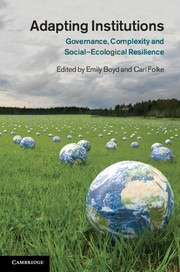Book contents
- Frontmatter
- Contents
- Illustrations
- Contributors
- Foreword
- Acknowledgements
- Acronyms and abbreviations
- 1 Adapting institutions, adaptive governance and complexity: an introduction
- Part I Adapting local institutions, networks, leadership and learning
- Part II Adapting and governing public institutions for uncertainty and complexity
- 6 Adaptive capacity and the ecostate
- 7 Food systems and adaptive governance: food crisis in Niger
- 8 Public–private partnerships in the provision of environmental governance: a case of disaster management
- Part III Adapting multi-level institutions to environmental crisis
- Index
- References
7 - Food systems and adaptive governance: food crisis in Niger
from Part II - Adapting and governing public institutions for uncertainty and complexity
Published online by Cambridge University Press: 05 November 2011
- Frontmatter
- Contents
- Illustrations
- Contributors
- Foreword
- Acknowledgements
- Acronyms and abbreviations
- 1 Adapting institutions, adaptive governance and complexity: an introduction
- Part I Adapting local institutions, networks, leadership and learning
- Part II Adapting and governing public institutions for uncertainty and complexity
- 6 Adaptive capacity and the ecostate
- 7 Food systems and adaptive governance: food crisis in Niger
- 8 Public–private partnerships in the provision of environmental governance: a case of disaster management
- Part III Adapting multi-level institutions to environmental crisis
- Index
- References
Summary
Introduction
Many developing countries are struggling to provide adequate food to their population. The impact of global environmental change on food security is largely unknown, and this increasing uncertainty highlights the need to identify the governance institutions that underpin food security and the potential of these institutions to adapt to changing circumstances. Considering the increasing population and the increasing number of under- and malnourished people in the world, this is increasingly important.
Current understandings of food security, drawing on agricultural economics, have largely been dominated by a research agenda that focuses on the demand for and supply of food, but since the 1990s a more holistic concept of food security has been advocated. It is argued that a systemic understanding of food security includes not only the production and consumption of food but also processes within the environment in which the activities related to food take place, and interactions between those activities and the environment. A new way of understanding food security opens up the possibility of discussing adaptive governance and adaptive institutions in changing environments in relation to food security, as more emphasis is placed on issues of governance and institutions.
- Type
- Chapter
- Information
- Adapting InstitutionsGovernance, Complexity and Social-Ecological Resilience, pp. 148 - 170Publisher: Cambridge University PressPrint publication year: 2011

